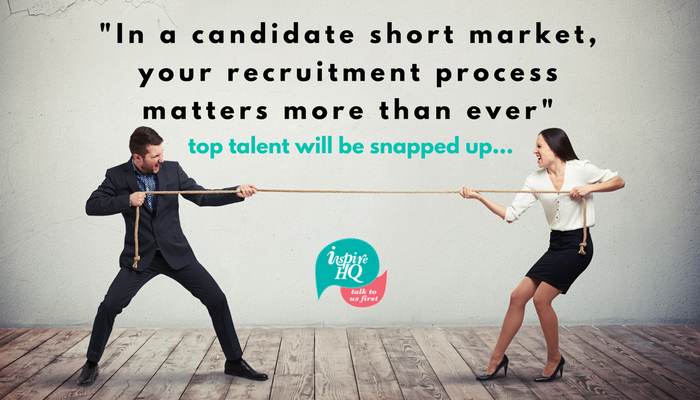If you have tried to recruit in recent months in the Ballarat region chances are you will have found that top talent is hard to find. With the unemployment rate sitting at 4.1% for the region; being the lowest it has been for many years, and with many industries experiencing skilled candidate shortages, the competition for hiring top talent has become fierce. What does this mean if you are trying to recruit?
- If you are recruiting for a position where that skill set is in demand, chances are you’ll end up having to contend with a job seeker who has multiple job offers to consider.
- Head hunting is on the rise. I’m frequently hearing of people being tapped on the shoulder and “headhunted” for positions.
- If you are hiring you need to step up your recruitment process to source, attract and recruit the top talent you want. Gone are the days of simply putting an advert in the local paper or on an online job board and waiting for the top talent to come to you.
In a candidate short market top talent has much greater control and influence on the recruitment process. They have increased negotiating power; it’s not just about the dollars and getting a higher salary package. They will be able to influence the timeline of the recruitment process to a greater degree because top talent won’t wait; they will go searching for the next opportunity and be snapped up. They will be interviewing and assessing you and the business (which they should be doing anyway) with increased effort because they need to decide which opportunity will be better for them.
The most frustrating and disappointing thing when recruiting is getting towards the end of the process and the candidate you have identified as your preferred candidate tells you “I have accepted another offer” or “I’m considering another offer.” Now you have to negotiate and influence like there is no tomorrow if you want to secure this top talent (but at the same time how desperate do you want to seem?). Or if it’s too late, all your time and effort has gone down the drain and if you haven’t got a second candidate waiting in the wings then it is back to the drawing board to start all over again.
There are a few things you can do differently during your recruitment process to minimise the chances of losing top talent through the recruitment process.
- Increase the communication
One of the biggest complaints I hear from job seekers is the lack of communication. Keep close to talent and keep them informed. Let them know timelines, when they can expect to hear from you and stick to your word. If the timeline blows out, tell them that. An update is better than no news at all.
- Understand their motivations
Throughout the recruitment process seek to determine the candidates motivations and interest for your opportunity specifically. What is motivating them to leave their current role and show interest in your role. If you know this you can then leverage this in the negotiation stage.
- Manage the timeline
It’s common for recruitment timelines to blow out. You are recruiting because you are replacing someone or because you have grown and need an extra pair of hands, either way that means you are probably under the pump and time poor. Throw into the mix a recruitment process and you can see how sometimes the recruitment process can take a back seat when you still have to do your job. The reality is top talent won’t wait and will be snapped up. Plan your recruitment timeline and wherever possible stick to it. Once you have interviewed and invested that time you don’t want to delay; candidates will be most engaged in the opportunity immediately after an interview, don’t let that engagement and interest wane because you don’t get back to them for weeks on end.
- Ask the question
Where are you at in your job search? Knowing where a candidate is at in their job search will arm you with valuable information and help you navigate the recruitment process. Probe to see if they have applied for other opportunities, had other interviews or are considering other offers. Will they tell you the truth? It depends on the relationship you have established with them and how you frame the question. Bluntly rolling out “where are you at in your job search” probably won’t elicit much information but by explaining the recruitment process and timeline you are going to be following you can then lead in to “how does this timeline work for you based on any other applications you may have pending?” Alternatively, by re-affirming your interest in their application and skill set and asking them to let you know about any changes to their circumstances (such as other interviews or job offers) sends the message that you are serious about their application.
If there is one thing I have learnt in recruitment it’s that people can be unpredictable and they change their mind. Following these tips won’t guarantee you can secure the top talent you want but it will give you the opportunity to have much greater influence and control over the recruitment process, increase your chances of recruiting the person you want for the job.


